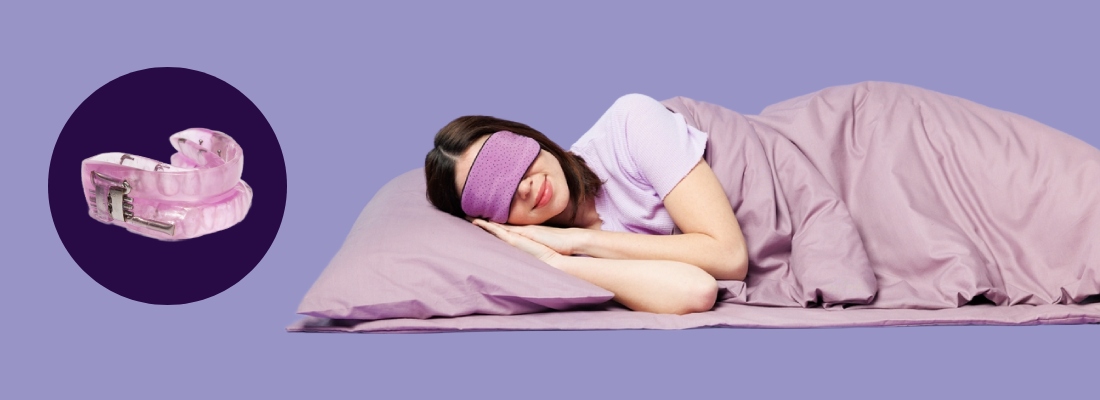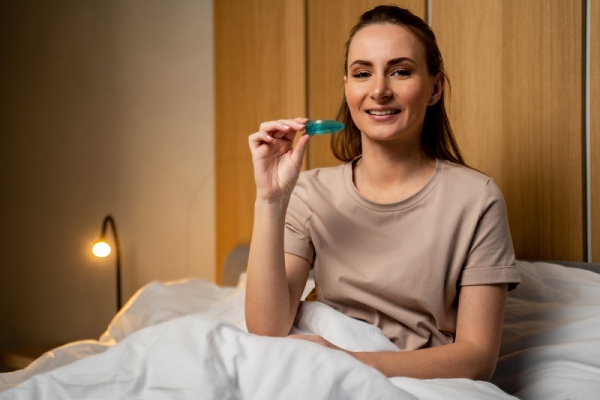
Did you know that around 10-30% of adults are suffering from Obstructive Sleep Apnea (OSA). During this condition, a person’s air passage collapses, may be partially or completely. You might have heard CPAP machine as a potent treatment option for treating OSA. However, not everyone finds CPAP a convenient option and there is a need for better therapy. This is where mouth guard for sleep apnea comes into action.
Additionally, a mouth guard for sleep apnea, also known as an oral appliance, is an increasingly popular alternative for those looking for a simpler, more comfortable way to treat mild to moderate cases. Moreover, if you want to know more about mouth guard for sleep apnea, cling to this blog till the end.
How Do Mouth Guards Work for Sleep Apnea?
A mouth guard helps keep your airway open during sleep. It repositions your lower jaw or tongue to prevent airway collapse during sleep. Unlike CPAP machines, these devices are not bulky, and don’t require power, hoses, or masks, making them an appealing choice for many.
Additionally, there are two primary types of sleep apnea mouth guards:
- Mandibular Advancement Devices (MADs) – These look similar to mouth guards worn by athletes and work by moving the lower jaw forward slightly. This forward position helps keep the upper airway open during sleep.
- Tongue Retaining Devices (TRDs) – These hold the tongue in a forward position to prevent it from blocking the airway.
Furthermore, both types of devices are worn during sleep. If your sleep physician thinks you need a mouth guard, they will order a custom-fitted device for optimal comfort and effectiveness.
What is Sleep Apnea?
Sleep apnea is a condition where breathing repeatedly stops and starts during sleep. The most common form, Obstructive Sleep Apnea (OSA), happens when throat muscles relax and block the airway. Other forms include Central Sleep Apnea, where the brain fails to send proper signals to breathing muscles, and Complex Sleep Apnea Syndrome, which is a combination of both.
Common symptoms include loud snoring, gasping for air during sleep, morning headaches, daytime sleepiness, and trouble concentrating. If left untreated, sleep apnea can lead to high blood pressure, heart disease, stroke, and even accidents caused by extreme fatigue. Moreover, there are studies that suggest that having sleep apnea multiplies the chance of getting seizures. Therefore, early diagnosis is the key to getting a step closer to restful nights and energetic days.
Therefore, you need to contact a proper sleep apnea treatment center that helps to diagnose the sleep condition timely manner and helps you make informed decisions in your own space.
While CPAP therapy is often the first recommendation, not everyone can tolerate it. That’s why a growing number of patients are exploring the option of a mouth guard for sleep apnea.
How Mouth Guards Treat Sleep Apnea?
Oral appliances for sleep apnea target the structural factor that lies behind this disorder. Usually, they change the position of the lower jaw and push it forward, thus opening the air passageway. However, some mouth guards work by adjusting the tongue’s position. The type of mouth guard will depend upon the physician’s diagnosis of the underlying factor behind sleep apnea.
Benefits of Mouth Guards for Sleep Apnea
Using a sleep apnea mouth guard offers several benefits, especially for those with mild to moderate OSA or those who struggle with CPAP therapy.
- Comfort and Convenience: A mouth guard for sleep apnea is small, silent, and portable. It’s easy to travel with and doesn’t require electricity or batteries.
- Higher Compliance Rates: Many people stop using their CPAP machines due to discomfort. Mouth guards, however, tend to be better tolerated, resulting in higher usage and improved sleep.
- Improved Sleep Quality: By keeping your airway open, a sleep apnea mouth guard can reduce snoring and nighttime awakenings, allowing for deeper, more restorative sleep.
- Non-Invasive: Unlike surgical options, mouth guards are completely non-invasive and reversible if they don’t work for you.
- Lower Cost: Over time, they may be more affordable than CPAP therapy, especially when factoring in ongoing maintenance and electricity use.
For many, the transition to a mouth guard for sleep apnea leads to dramatic improvements in their energy levels, mood, and overall well-being.
Struggling with Sleep Apnea?
Discover a convenient and effective way to manage your sleep apnea without leaving your home.
Risks of Sleep Apnea Mouth Guards
Although mouth guards seem a more reliable option than CPAP machines, it’s not as effective in treatment as a CPAP machine. This is evident from the ratio of people getting better with a CPAP than a mouth guard, and this ratio stands at twice the factor.
Furthermore, research has shown results that lie in favor of a CPAP machine for treating sleep apnea more than a mouth guard. CPAP increases oxygen supply with better outcome and aids in further reduction of respiratory events while sleeping. On the other hand, mouth guards haven’t shown any positive outcome in around one-third of the population.
Oral appliances may be more pleasant for certain people than CPAP, but not for everyone. According to a short survey, discomfort caused more than half of the participants to discontinue wearing their mouth guard after a year. On the other hand, people who kept using the mouthguard reported improved sleep, with less snoring and drowsiness during the day.
Should You Use Mouth Guards? Who is Better Suited to Use Them?
Mouth guard treatment isn’t for everyone. It works best for:
- People with Mild to Moderate OSA: Studies show high effectiveness in this group.
- Those Who Cannot Tolerate CPAP: If you find CPAP machines too uncomfortable or noisy, a mouth guard could be a viable alternative.
- Patients Without Major Dental Issues: Good oral health and a stable bite are necessary for a proper fit.
Before starting, visit a reliable sleep apnea treatment center and a reliable sleep physician who helps to identify the sleep issue. They will assess the condition and then suggest the best mouth guard that will help you overcome your sleep condition.
Getting a Mouth Guard: What to Expect
The process of getting a mouth guard for sleep apnea is straightforward:
- Consultation: After a confirmed sleep apnea diagnosis, your doctor may refer you to a dentist who specializes in oral appliance therapy.
- Custom Fitting: The dentist takes impressions of your teeth to create a personalized mouth guard.
- Adjustment Period: You may need a few nights to get used to the device. Some initial soreness is normal.
- Follow-Up Visits: Your dentist will schedule follow-ups to monitor your progress, adjust the device if necessary, and ensure it’s working effectively.
Regular monitoring is essential to track improvements and make sure the mouth guard for sleep apnea continues to meet your needs.
Ready to Take Control of Your Sleep?
Take the first step toward better health—schedule your visit now with our expert team.
Conclusion
To conclude, if disrupted sleep is your daily life hurdle and using big CPAP machines is your nightmare, then an easy option is available for you, mouth guards for sleep apnea. By gently repositioning your jaw or tongue, these oral appliances can keep your airway open and reduce symptoms such as snoring and interrupted sleep. While not suitable for everyone, especially those with severe OSA, a sleep apnea mouth guard can make a remarkable difference when fitted and used properly.
Additionally, Home Sleep Center is your reliable partner in providing remote sleep studies and sleep solutions. Now you don’t need to walk or wait in long queues to get closer to ga ood night’s sleep.

